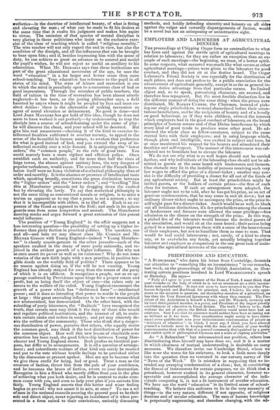EMPLOYERS AND LABOURERS AT AGRICULTURAL DINNERS.
THE proceedings at Chipping Ongar form no contradiction to what has been said against the servile spirit of agricultural meetings in relation to labourers ; for they are rather an exception than an ex- ample of such meetings—the beginning, we trust, of a better spirit. In some respects, what occurred was much like what occurs at other agricultural meetings—prizes were given to the labourers for good conduct, and they did not sit at the festive board. The Ongar Labourer's Friend Society is one especially for the distribution of such prizes, and does not profess to be a public association for the advancement of agriculture generally, except in so far as general in- terests derive advantage from that particular means. Its limited object and, so to speak, patronizing character, are avowed, and therefore less repugnant. But the most forcible distinction lies in the different manner of doing the same thing : when the prizes were distributed, Mr. RAISES CURRIE, the Chairman, instead of pick- ing out single prizeholders, to stand shamefaced before their osten- tatious benefactors, and be the recipients of bounty and of a homily on good behaviour, as if they were children, avowed the interest which employers had in the good conduct of labourers, on the broad principles of human nature and of that Divine beneficence by which every kind of good tends to produce some other good. He ad- dressed the whole class as fellow-creatures, subject to the same eternal laws with their employers; and in using language which, though plain and intelligible, was exalted in subject and tone, he at once manifested his respect for his hearers and stimulated their faculties and self-respect. The manner of this intercourse was cal- culated not to humiliate but to elevate the labourer.
We do not see why what is so well begun should not be carried further, and why individuals of the labouring class should not be ad- mitted as guests at the same board with landowners and farmers. One obstacle may lie in the inability of persons receiving such very low wages to afford the price of a dinner-ticket ; another may con- sist in the difficulty of providing a dinner for all out of the funds of any agricultural society. But at least the prizeholders might be invited guests, or the holders of certain prizes—the first of each class for instance. If such an arrangement were adopted, the labourer ought not to be told, after he has got his prize, as an act of gracious condescension, that he may come in and sit down ; but an ordinary dinner-ticket ought to accompany the prize, or the prize it- self might pass for a dinner-ticket. And it would be as well, to block out all invidious distinctions, if a few prizeholders among the classes of landowners and farmers were allowed the same privilege—free admission to the dinner on the strength of the prize. In this way, a picked few of the labourers would become the invited guests of the association, and would sit at the same board ; their access being gained in a manner to impress them with a sense of the benevolence of their employers, but not to humiliate them as man to man. That would be real social intercourse ; not, surely, of a kind to alarm any, or to overwhelm any funds, yet actually bringing together labourer and employer as companions in the one great task of main- taining the agricultural interests of the country.


























 Previous page
Previous page